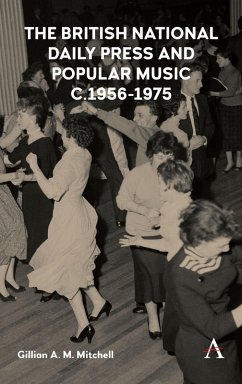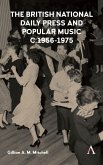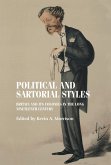'The British National Daily Press and Popular Music, c.1956-1975' constitutes a reappraisal of the reactions of the national daily press to forms of music popular with young people in Britain from the mid-1950s to the 1970s (including rock 'n' roll, skiffle, 'beat group' and rock music). Conventional histories of popular music in Britain frequently accuse the newspapers of generating 'moral panic' with regard to these genres and of helping to shape negative attitudes to the music within wider society. The book questions such charges; in doing so, it also challenges the tendency to perceive evidence from newspapers straightforwardly as a mere illustration of wider social trends and considers the manner in which the post-war newspaper industry, as a socio-cultural entity in its own right, responded to developments in youth culture as it faced distinctive challenges and pressures amid changing times.
Commencing with an analysis of the reactions of various key popular and 'serious' daily national papers to the so-called 'rock 'n' roll cinema riots' of 1956, which represented the first occasion on which this musical form became 'headline news' in Britain, 'The British National Daily Press and Popular Music, c.1956-1975' considers the extent to which ingredients of 'moral panic' were present in press coverage of popular music, both in 1956 and at subsequent points throughout the period. However, by examining other factors, such as the more varied coverage which did frequently appear, the relative lack of sustained public concern in response to the more inflammatory reports and the contrasts in perspective among the various individual newspaper titles, each of which possessed its own particular 'voice' at this time, a more nuanced picture emerges. The work also considers press coverage of popular music beyond the headlines, focusing particularly on the 'disc columns' and pop record review pages which became more prevalent as this period progressed. It notes that, although the 'serious' newspapers would ultimately develop a more sophisticated approach to rock criticism, the popular papers -especially the Daily Mirror - played a particularly significant role in bringing the music to a wider, cross-generational reading public during the earlier portion of this period, aiming to devise a suitable vocabulary for the dynamic, ever-changing music styles and 'scenes' of this era.
Ultimately, 'The British National Daily Press and Popular Music, c.1956-1975' encourages scholars to avoid hasty or sweeping deployment of such phrases as 'moral panic' when considering early press reactions to popular music. It also argues that the distinctive and paradoxical mixture of uncertainty, enthusiasm, sensationalism and curiosity which characterised much national press coverage of rock 'n' roll and other kinds of music helped, in many ways, to set the tone for adult responses to popular music within society at large. Just as the press was not unilaterally hostile towards popular music, so too were members of 'the older generation' more varied in their responses to the music than has previously been assumed.
Commencing with an analysis of the reactions of various key popular and 'serious' daily national papers to the so-called 'rock 'n' roll cinema riots' of 1956, which represented the first occasion on which this musical form became 'headline news' in Britain, 'The British National Daily Press and Popular Music, c.1956-1975' considers the extent to which ingredients of 'moral panic' were present in press coverage of popular music, both in 1956 and at subsequent points throughout the period. However, by examining other factors, such as the more varied coverage which did frequently appear, the relative lack of sustained public concern in response to the more inflammatory reports and the contrasts in perspective among the various individual newspaper titles, each of which possessed its own particular 'voice' at this time, a more nuanced picture emerges. The work also considers press coverage of popular music beyond the headlines, focusing particularly on the 'disc columns' and pop record review pages which became more prevalent as this period progressed. It notes that, although the 'serious' newspapers would ultimately develop a more sophisticated approach to rock criticism, the popular papers -especially the Daily Mirror - played a particularly significant role in bringing the music to a wider, cross-generational reading public during the earlier portion of this period, aiming to devise a suitable vocabulary for the dynamic, ever-changing music styles and 'scenes' of this era.
Ultimately, 'The British National Daily Press and Popular Music, c.1956-1975' encourages scholars to avoid hasty or sweeping deployment of such phrases as 'moral panic' when considering early press reactions to popular music. It also argues that the distinctive and paradoxical mixture of uncertainty, enthusiasm, sensationalism and curiosity which characterised much national press coverage of rock 'n' roll and other kinds of music helped, in many ways, to set the tone for adult responses to popular music within society at large. Just as the press was not unilaterally hostile towards popular music, so too were members of 'the older generation' more varied in their responses to the music than has previously been assumed.
Dieser Download kann aus rechtlichen Gründen nur mit Rechnungsadresse in A, D ausgeliefert werden.









